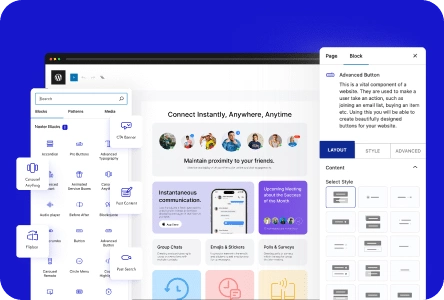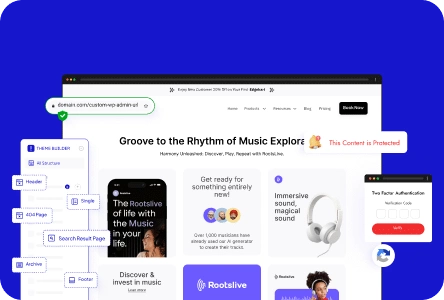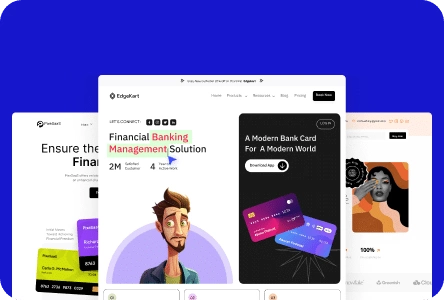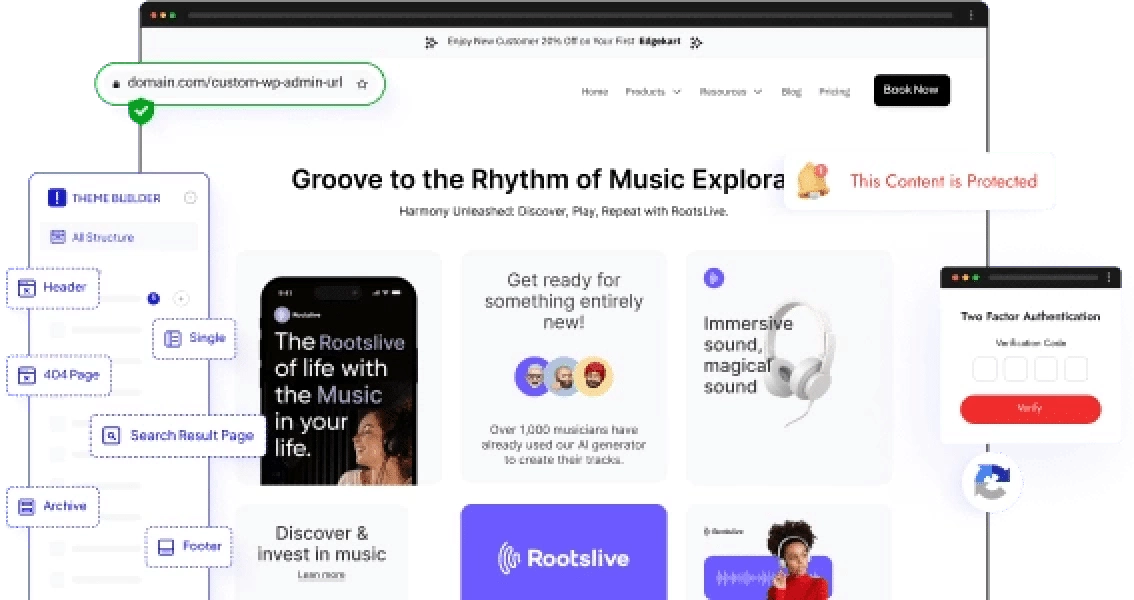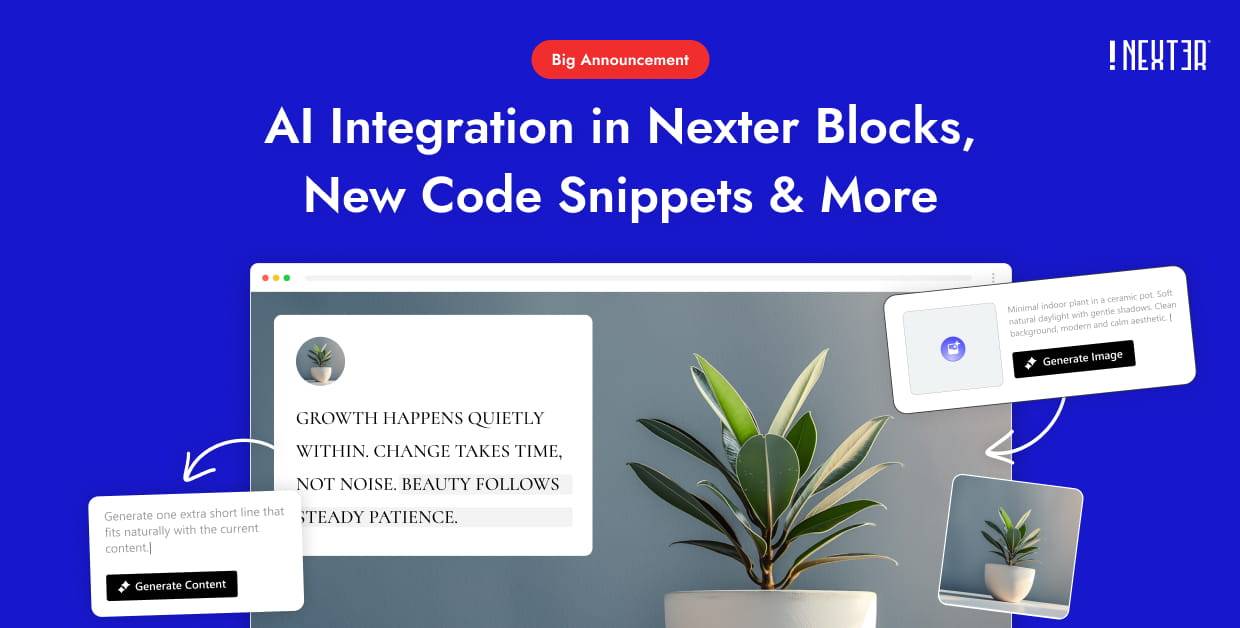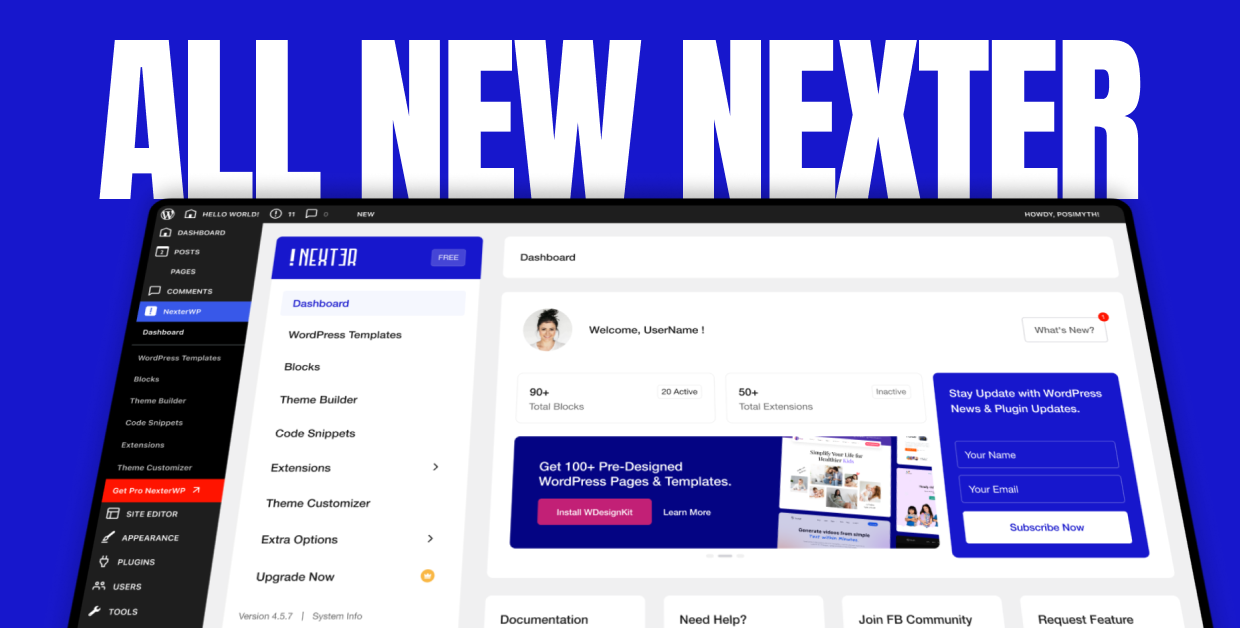Should you publish a landing page or build a website? Don’t rush your decision without reading this landing page vs. website comparison.
There are two ways to establish an online presence: a landing page and a website. Both instruments serve distinct purposes but are often misunderstood or used interchangeably.
A landing page is a streamlined, conversion-focused page designed to drive a particular action from users. In contrast, a website is a multi-faceted platform providing comprehensive information about a business, its products, services, and more.
So, join us as we explore the key differences between landing pages and websites and help you decide when to use each to achieve your objectives.
![Landing Page vs Website: Which to Use When? [8 Key Differences] 1 Landing Page Vs Website](https://nexterwp.com/wp-content/uploads/2024/12/Landing-Page-Vs-Website.webp)
What is a Landing Page?
A landing page is a standalone web page crafted with a specific marketing objective in mind. Its primary goal is to help you drive visitors toward a particular action or conversion.
This action could range from signing up for your newsletter, downloading resources, and registering for an event to purchasing a product.
Due to their focused objective, landing pages typically feature straightforward messaging and a clear call to action (CTA). This streamlined approach helps guide visitors efficiently to complete the desired action, thereby increasing the likelihood of conversions.
![Landing Page vs Website: Which to Use When? [8 Key Differences] 2 What is Landing Page](https://nexterwp.com/wp-content/uploads/2024/12/What-is-Landing-Page.webp)
A construction company’s landing page inviting visitors to subscribe to their newsletter.
Benefits of a Landing Page
A landing page has these benefits:
- Targeted Messaging: Landing pages are designed with clear objectives and target a specific audience. This ensures that its content resonates with visitors and increases the likelihood of conversion.
- Higher Conversion Rates: Along with relevant messaging, clear call-to-actions guide visitors towards the desired action. Furthermore, a lack of unnecessary content or too many outbound links minimizes distractions.
- Lead Generation: Landing pages are perfect for capturing leads. You can offer something valuable in exchange for visitor information, such as a free guide or a discount.
- Easier Testing and Optimization: A landing page is a single web page with limited content. Therefore, you can easily test different headlines, images, and CTAs to determine what works best and optimize the page for better results.
- Cost-Effective Advertising: You can maximize the return on investment from your advertising campaigns by directing paid traffic to a landing page with a clear and relevant CTA.
If you want to make a Landing page to drive traffic for conversation. Check out How To Create a High-Converting Landing Page.
What is a Website?
A website is a collection of interconnected web pages that exist under a single domain name. It serves as a comprehensive online presence for your business or organization, providing a wide range of information and functionalities.
Websites can vary significantly in complexity, from simple personal blogs to complex e-commerce platforms.
Each website page serves a unique purpose, whether it’s delivering information about your products and services, sharing company news, offering customer support, or facilitating online purchases.
Therefore, it also features functionalities like a home page, navigation menu, and interlinks to help visitors easily navigate your site.
![Landing Page vs Website: Which to Use When? [8 Key Differences] 3 What is website](https://nexterwp.com/wp-content/uploads/2024/12/What-is-website.webp)
A travel website’s home page.
Benefits of A Website
Benefits of a website include:
- Comprehensive Information: The website, with its numerous web pages, provides a wealth of information to visitors at a single virtual location, including details about products, services, company history, contact information, and more.
- Multi-Purpose Sites: A single website can feature multiple functionalities, including landing pages for various marketing and ad campaigns, a dedicated blog, product pages, and an e-commerce store.
- Brand Building and Trust: Today, a website is a critical element of branding. A professional and intuitive website is essential to building trust among your visitors, especially if you want your site to be a digital storefront for potential customers.
- SEO and Organic Traffic: You can optimize your site for search engines to improve its visibility and generate organic traffic. Moreover, you can publish high-quality content and implement SEO strategies to drive long-term sustainable traffic growth.
- Scalability: As your brand grows, you can easily scale your site by adding new content, sections, and web pages. You can also expand your site by adding more products and publishing more content.
The header and footer are two commonly appearing sections on a website. Check outhow to create header & footer in WordPress.
Landing Page Vs. Website [8 Key Differences]
| Features | Landing Page | Website |
|---|---|---|
| Objective | Convert visitors into leads or customers. | Provide detailed information about a business, its services, products, etc. |
| E-Commerce | Used to promote products and offers. | Used to host fully functional online stores. |
| Traffic Sources | Email campaigns and paid channels like search ads, social media ads, etc. | Traffic sources include organic search, direct visits, social media, referrals, and paid ads. |
| Navigation | Lacks a navigation menu to reduce distraction and prevent users from leaving the page. | Includes navigation menu to help users access different sections and pages of the site with ease. |
| SEO & Visibility | Organic visibility is restricted due to limited SEO opportunities. | Optimizations such as keywords, meta tags, descriptions, alt tags, etc., ensure the site remains visible in SERP results. |
| Templates Collection | Customizable templates for different use cases, including lead generation, promoting products, getting subscribers, etc. | Customizable templates for individual sections, single pages, and entire websites are available. |
| Flexibility and Customization | Less flexible given their focus on a single goal, i.e., conversions. However, customization options are adequate. | High flexibility with limitless customization possibilities. |
| Hosting | Hosted on a sub-domain or third-party platform for hosting landing pages. | Requires fully managed or self-managed hosting solution. |
Now, let’s explore eight key differences between a landing page and a website
1. Landing Page Vs. Website: Objective
The primary difference between a landing page and a website is the objectives you plan to achieve with them. Landing pages are designed to achieve one objective, i.e., to convert visitors into leads or customers.
Simply put, their purpose is to motivate users to take a desired action, like signing up for email campaigns, downloading an eBook, claiming discounts, and more.
![Landing Page vs Website: Which to Use When? [8 Key Differences] 4 Landing page CTAs](https://nexterwp.com/wp-content/uploads/2024/12/Landing-page-CTAs.webp)
Websites, on the other hand, are digital spaces where visitors can engage with you, your brand, or your organization.
Therefore, they serve multiple purposes, including providing detailed information about a business, its services, products, and more. They include multiple product pages, a separate about section, lead generation pages, blogs, etc.
2. Landing Page Vs. Website: E-Commerce
Landing pages are an essential element of e-commerce. However, their scope is limited to one product or offer.
They feature a consistent message and single call-to-action, making it simple for visitors to convert, whether they arrive on the page from an ad or email campaign.
Unlike landing pages, a website can house a fully functional e-commerce store. Your site can include all essential online shopping features, including product listings, categories, carts, customer accounts, checkout windows, and more.
3. Landing Page Vs. Website: Traffic Sources
Another crucial difference between a landing page and a website is their sources of traffic. A landing page’s traffic primarily comes from paid channels like ads, while a website can generate both organic and paid traffic.
If you run search and social media ads or do email marketing, you must redirect users to a purpose-built landing page that features messages, offers, and CTA relevant to the source campaign.
It increases the likelihood of conversion and increases the return on ad spend.
Websites can attract traffic from diverse sources, including organic search, direct visits, social media, referrals, and paid ads. This is because a site often features multiple pages and sections designed for specific target audiences.
For instance, blog posts and the homepage typically draw organic visitors from search engines, while product pages and promotional sections attract traffic from targeted marketing campaigns and direct referrals.
Looking to improve your website traffic without coding? Here are the 5 Best Free SEO Plugins for WordPress you can try.
4. Landing Page Vs. Website: Navigation
Although a landing page is essentially a web page, you won’t find a navigation bar on it. This isn’t a drawback but a clever design tactic.
A landing page’s sole purpose is to prompt users to take one specific action. Without a navigation menu, users aren’t distracted by other options, ensuring they focus solely on the intended call to action.
The only time you may see a navigation menu on a landing page is when it is a part of a website.
In that case, the menu helps keep users engaged by allowing them to navigate to different sections of the site, reducing the likelihood of them bouncing to competing sites.
On the contrary, the navigation menu is an essential element of a website. It includes links to key pages such as the homepage, product pages, blog posts, and more, offering a structured path for users to follow.
This helps users find the information they need and improves their overall experience.
Top: Landing page without menu. Bottom: Website with navigation menu and sub-menus.
Having difficulty in adding a page to your WordPress site’s menu? Here are 5 easy ways to add a web page to a menu.
5. Landing Page Vs. Website: SEO & Visibility
Landing pages offer little to no opportunity to benefit from SEO efforts due to their limited scope in terms of content. Therefore, their visibility in organic search results is restricted.
They work best when used in tandem with a PPC ad, social media ad, or email campaign. It helps you drive traffic from the source campaign to these pages and convert the visitors.
Unlike landing pages, SEO is one of the key pillars to ensure your site remains visible on the Internet.
You must implement comprehensive SEO strategies, including keyword optimizations, content optimizations, and technical SEO, to drive organic traffic to various pages and sections of your site.
6. Landing Page Vs. Website: Templates Collection
Whether designing a landing page or a complete website, you’ll find plenty of readymade templates to ease things down.
Depending on your landing page builder, you shouldn’t have any problem finding unique templates for specific use cases ranging from promotions and lead generations to resource downloads.
Similarly, you’ll find a broad range of templates for website design, especially if you’re using a website builder like WordPress or Wix.
You’ll find customizable templates for full-fledged websites, whether you’re making a blog or an online store. Moreover, there are separate template collections for product pages, menus, forms, and other sections of your site.
Using WordPress to manage your site and landing pages? Speed up your design process with WDesignKit by POSIMYTH Innovations. WDesignKit features a library of 2000+ readymade templates, including websites, pages, sections, and widgets.
Its no-code builder ensures you can customize your designs in minutes.
![Landing Page vs Website: Which to Use When? [8 Key Differences] 5 WDesignKit Template library](https://nexterwp.com/wp-content/uploads/2024/12/WDesignKit-Template-library.webp)
Readymade Templates offered by WDesignKit
7. Landing Page Vs. Website: Flexibility and Customization
All landing page templates are built with one intention, i.e., to drive conversions. They heavily focus on maintaining simplicity and clarity.
Therefore, designs often feature similar UI elements and layouts regardless of the page’s conversion goal. However, you can still have ample customization options. You can tweak the color scheme and typography, use your own media files, etc.
Compared to a landing page, a website offers extensive flexibility and customization. You can design your site pages so that every section appears unique.
Alternatively, you can adopt a more standardized approach, creating a cohesive design throughout to ensure a consistent user experience and reinforce brand identity across all pages.
If you rely on WordPress to customize web pages and sites, you must check out the Nexter Blocks plugin. This freemium addon comes with 90+ Gutenberg blocks, ranging from menus and forms to social feeds and pop-ups. You can also customize these blocks to match your website’s visual style.
8. Landing Page Vs. Website: Hosting
The last difference between landing pages and websites to consider is the hosting. Landing pages are often hosted on a subdomain or a third-party platform specifically designed for hosting landing pages.
Websites, on the other hand, require you to register a domain and invest in a self-hosting or managed-hosting solution. This is essential as a site has to handle multiple pages, various functionalities, and high traffic volumes.
Stay updated with Helpful WordPress Tips, Insider Insights, and Exclusive Updates – Subscribe now to keep up with Everything Happening on WordPress!
Wrapping Up
Understanding the differences between landing pages and websites is crucial, whether you’re a website owner, digital marketer, or web designer.
Landing pages focus on a single objective, driving quick conversions through targeted campaigns, while websites are home to comprehensive information and offer extensive customizations and flexibility.
So, which one should you choose?
Landing pages are perfect if you only run targeted marketing campaigns with a specific objective, such as driving quick conversions and promoting single products or offers.
However, if you want to inform visitors about your products and services, go with a website. A site is also ideal for long-term brand building, content marketing, and organic traffic growth.
Take your designs to a whole new level with the Nexter Blocks by POSIMYTH Innovations. It provides more than 90 Gutenberg blocks for designing websites and landing pages in WordPress.
![Landing Page vs Website: Which to Use When? [8 Key Differences] 6 Nexter BLocks 1](https://nexterwp.com/wp-content/uploads/2024/10/Nexter-BLocks-1-951x1024.webp)
Check out the 90+ Blocks Library from Nexter Blocks
Further Read: Now that you know the differences between landing pages and websites, learn how to create high-converting landing pages with Elementor.
FAQs about Landing Page vs Website
Do I need a website if I have a landing page?
If you have a landing page, you don’t necessarily need a website unless you want to publish more landing pages or other content, such as blog posts and product pages, under the same domain.
Are landing pages better than websites?
Landing pages are better than websites in driving specific actions, like lead generation or product promotion, due to their focused design. All you need to do is publish a single page with one call to action, which is much more manageable than a full-fledged website.
Is a landing page cheaper than a website?
Yes, a landing page is cheaper because it requires less design and development effort compared to a website. Also, the cost of hosting a single-purpose landing page is much lower than hosting a website with multiple pages and advanced functionalities.
What is the main purpose of a landing page?
The main purpose of a landing page is to encourage users to perform a desired action, such as subscribing to a newsletter, providing contact in exchange for an eBook, accepting a promotional offer, etc.
Should landing pages have their domain?
While it’s not necessary, landing pages with their domains have many benefits. If landing pages have unique web addresses, it becomes easier to share them. At the same time, tracking their traffic and engagement levels also becomes more straightforward.
What is the success rate of landing pages?
The success rate of landing pages depends on multiple factors, including the quality of content, placement of the CTA, and even the effectiveness of the source ad campaign in gaining users’ attention. The average conversion rate of landing pages across all industries is 5.89%, while 10% is an ideal number to strive for.
Can you sell on a landing page?
Yes, you can sell a single product or offer on a landing page by including clear calls to action, detailed product information, and a straightforward checkout process.

